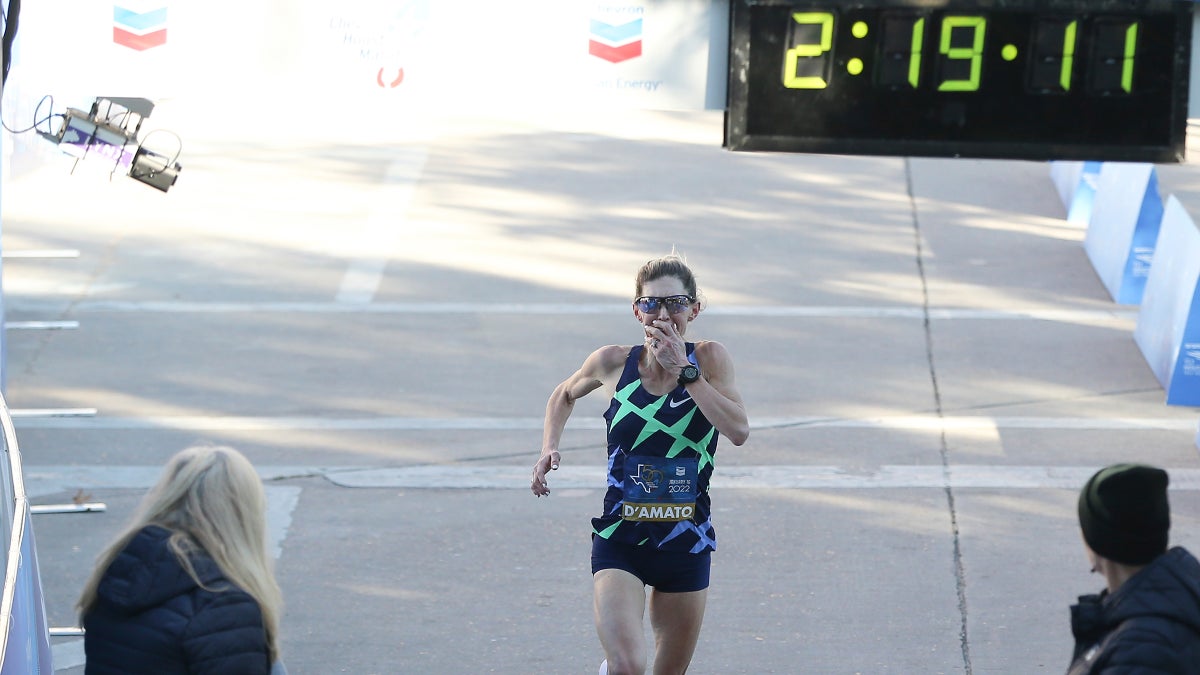No products in the cart.
Outdoor Adventure
How Keira D’Amato Ran the Race of Her Life
For exclusive access to all of our fitness, gear, adventure, and travel stories, plus discounts on trips, events, and gear,
sign up for Outside+ today.
On a cold, breezy day this past weekend in Houston, 37-year-old Keira D’Amato set a new American record in the marathon. Working with her pacers Calum Neff and Silas Frantz, she finished in 2:19:12—24 seconds faster than Deena Kastor’s mark, which was set at the 2006 London Marathon. Before last Sunday, Kastor was the only American woman to have broken the 2:20 barrier; her benchmark had survived the illustrious careers of athletes like Shalane Flanagan and Kara Goucher and the advent of the “super shoe” era. It was, as Letsrun had it, “the one American record everyone wanted.”
Until recently, few people would have picked D’Amato as Kastor’s likely successor. Although she had been an All-American in college, D’Amato subsequently spent years away from the sport, working full-time as a realtor and raising two kids with her husband Anthony. She only picked up running again in 2016 when she was in her thirties and looking for a physical release from the everyday demands of being a working mother. After running 3:17 in her debut marathon in 2017, she ran 2:44 at Grandma’s Marathon in 2018 and 2:34:55 at the 2019 Berlin Marathon. Such talent notwithstanding, the notion that D’Amato would progress from 2:35 to 2:19 in a little over two years to break one of the most long-standing records in American distance running was improbable, to say the least. “I can’t wrap my head around the magnitude of it,” D’Amato says, adding that she felt a kind of cognitive dissonance between what her training suggested she was capable of and the absurdity of going after such a lofty goal: “I told my husband that I felt really confident that I could run 5:18 pace for 26 miles, but I really couldn’t wrap my head around the American record part.”
For the past couple of years, the most obvious candidate to break Kastor’s record was Sara Hall, who will turn 39 in April and who has been on a tear since experiencing a late career breakthrough in 2019. Hall also raced in Houston last weekend and set a new U.S. record in the half marathon, running 1:07:15 to break Molly Huddle’s mark of 1:07:25 from 2018. (She finished second in the race behind Kenya’s Vicoty Chepngeno, who came home in 1:05:03.) In December 2020, Hall ran 2:20:32 at the Marathon Project in Chandler, Arizona. At the time, it was the second fastest marathon ever by an American woman and a performance that may have overshadowed the fact that D’Amato likewise had a stellar race in the same event, running 2:22:56 for an 11-minute PR.
“When I ran 2:22 that felt like a pretty controlled effort,” D’Amato says, recalling her Marathon Project experience. “I finished that race thinking that I could run faster since I never really hit a wall. It felt really smooth. And marathons never really feel smooth.”
One of the more intriguing counterfactuals about last Sunday in Houston is what might have transpired had Hall and D’Amato been competing in the same race. D’Amato may have beaten her to besting Kastor’s mark, but Hall clearly looks as well positioned as ever to run her fastest 26.2 miles. It wouldn’t be surprising if she took another shot at the new-and-improved marathon record before too long, although it will have to wait a bit since Hall is entered to race the Boston Marathon this coming April. (Boston is not a record-eligible course.)
At the end of the day, however, rivalries are more interesting than records, especially when there’s a storyline as compelling as the fact that the all-time fastest female American half and full marathoners are both mothers in their late thirties. Here’s to hoping that we will get to see a rematch of D’Amato vs. Hall in the not-too-distant future.
The notion that age is just a number is surely one of our more irresistible clichés, all the more so because it is one that is obviously false. For D’Amato, however, one of the benefits of competing at a world-class level at her age is that it gives her a sense of urgency. “It’s not lost on me that I am older than the majority of the people that I compete against, which is why I’ve really seized every opportunity that I can.”
But even as she recognizes that she will only have so many chances to maximize her potential, D’Amato says there’s something motivating about not knowing when she will stop improving. This, too, is a kind of useful contradiction: the simultaneous knowledge that your days may be numbered, but your future is unwritten.
“I think part of what allowed me to accomplish what I did on Sunday is just always looking forward to the future, so there wasn’t the pressure that this was the end-all-be-all for me,” she says. “I have no idea where my running career at this level is going to go and where the story is going to end. Maybe the best is yet to come. It’s a beautiful and exciting thing to get up every day and see what I can do.”
Source link

